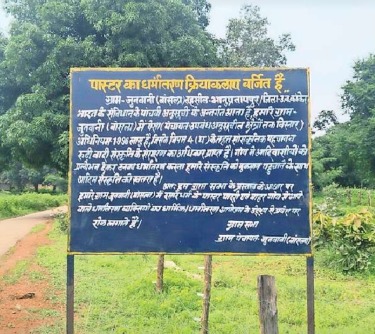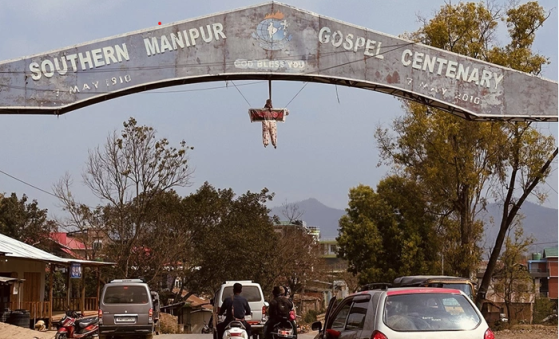
The Chhattisgarh High Court dismissed a public interest litigation filed by Christian organisations challenging restriction boards erected in villages of Kanker district that ban entry of pastors and converted persons.
The Progressive Christian Alliance and other Christian groups had approached the court seeking removal of hoardings placed outside villages in Bhanupratappur block of Kanker district. The boards clearly state that “entry of Christian pastors and converted persons coming for conversion is prohibited” and ban religious gatherings in these villages.
Eight villages in Kanker district have erected such restriction boards, according to the Progressive Christian Alliance. The village Ghotiya in Bhanupratappur block was specifically mentioned in court proceedings.
The restrictions appeared to be expanding even as the petition was being heard. On Sunday, September 7, 2025, village leaders from 20 villages held a meeting in Sulgi village, Kanker district, to pass similar resolutions. Sulgi has now also erected entry restriction boards at its entrance, with villagers citing concerns about 16 local families who have converted to Christianity. According to local reports, two Christian families have recanted their faith while 14 families continue to follow Christianity. Village leaders said their opposition was not against the Christian religion itself but against conversions of “simple village folk.”
During the hearing before Chief Justice on September 8, petitioners’ counsel sought dismissal of the petition as withdrawn, requesting liberty to file a fresh petition including appropriate parties. The Chief Justice granted the request, dismissing the petition “as withdrawn with liberty as prayed for.”
The dismissal was procedural rather than on merits, allowing the petitioners to refile their case after addressing defects in the original petition.
Christian groups argued that such restrictions constitute discrimination and violate constitutional rights, particularly religious freedom. “This is straight discrimination and an unconstitutional step,” their counsel argued in court.
The state government defended the village restrictions through Additional Advocate General Yashwant Thakur, who contended that outsiders come to villages to carry out conversions and prevent tribals from their traditional worship practices and idol worship. The restrictions were imposed through gram sabha resolutions, the court was informed.
The Chief Justice noted that concerned gram panchayats should also be made parties to the case, given that such notices are put up with gram sabha consent.
The boards specifically prohibit entry of “pastors of Christian religion and converted persons coming for conversion” and ban any religious programmes in the villages. Village residents have issued warnings against any pastor entering their areas.
Rev. Bhupendra Khora of the Progressive Christian Alliance confirmed that a fresh petition would be filed soon, addressing the procedural issues identified by the court.
When approached by Christian Today for comment, Akhilesh Edgar of the Progressive Christian Alliance declined to provide a statement, but clarified that “the petition was withdrawn solely to include additional respondents, as per the objection raised by the Additional Advocate General.” He emphasized that “no decision has been made on the petition itself” and said a fresh petition would be filed “within a day or two.”
The petition follows escalating tensions in the state’s tribal areas, including the recent arrest and subsequent bail of two Catholic nuns and incidents involving pastors, as reported earlier. The Sanatan Samaj’s August 5 demonstration in Bhanupratappur, which demanded government action against Christian activities, had preceded the current legal challenge.
The state government has announced plans to strengthen the Chhattisgarh Freedom of Religion Act, 1968, while the Religious Liberty Commission documented 86 incidents against Christian communities in the state between January and July 2025.
The court’s procedural dismissal allows petitioners to refile their case, setting the stage for a renewed legal challenge to the village restrictions that raise fundamental questions about religious freedom, community autonomy, and constitutional rights in tribal areas of the state.




